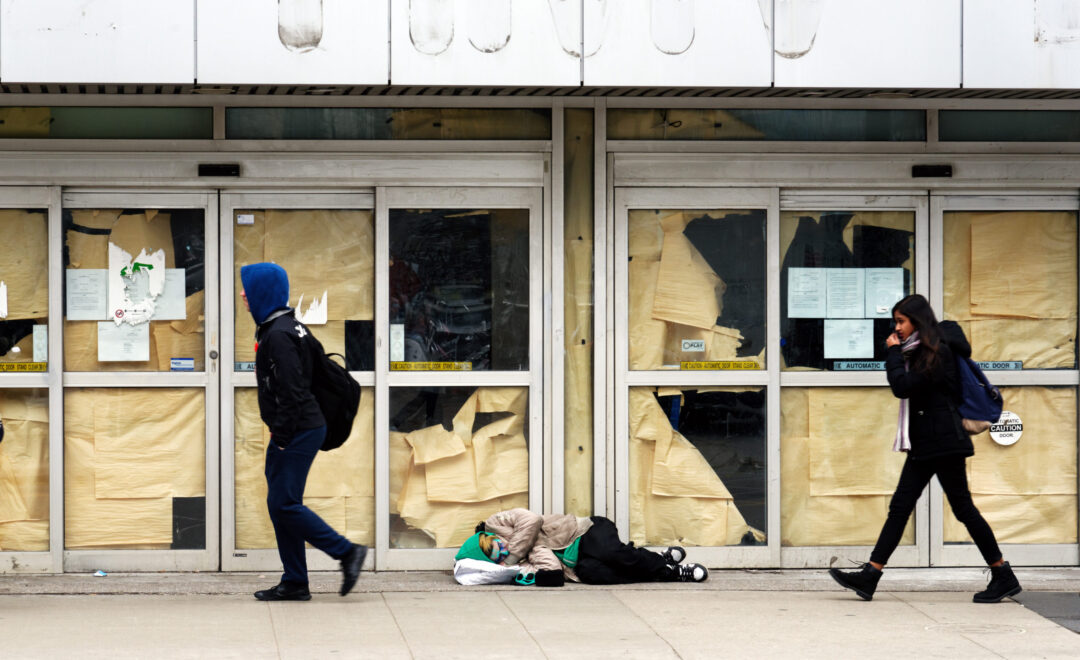Toronto physician Sandy Buchman, a palliative care specialist, will be drawing attention to the importance of social factors on health during a seminar at the Canadian Housing and Renewal Association 2021 Congress. Because poverty, like discrimination or exclusion, has a major influence on people’s wellbeing.
To explain the importance of social determinants on health, Dr. Sandy Buchman offers the image of a tree. “Imagine the fruit are the health outcomes: higher incidents of cancer, mental health and addictions, diabetes. The roots are the social determinants of health: your income, your race, your socioeconomic status, your education level. But you have to dig at the roots and [there we find] colonialism, racism, xenophobia, transphobia, etc. Human beings need housing despite what their roots are.”
For the palliative care physician, there is no doubt that the unsheltered face more health problems and have more difficulty accessing health care than people higher up in the social hierarchy.
These ideas will be presented at a conference entitled Housing and Health: A Conversation with Dr. Sandy Buchman, on April 28 at the Canadian Housing and Renewal Association’s annual conference.
Health as determined by society
While he can’t cite statistics on the number of deaths that would be preventable if people living with homelessness had roofs over their heads, having a home is good for your health, Buchman asserts. This includes access to health and social services, protection against the weather, and a place to cook and eat.
Buchman uses another example to illustrate his point about the social determinants of health, that of the experiences of his patients in two Toronto neighbourhoods. These two sectors, bordering each other in southern Toronto, just west of the Don Valley, have realities as different as “day and night.” To the north: Rosedale, a wealthy enclave dotted with mansions. On the south: the Sherbourne-Dundas district, where many people are homeless.

The people he treats in the two communities all have serious illnesses. “They both need compassionate care, but the resources that people have in Rosedale, even in a universal healthcare system, are thousands of times above those [of people] experiencing homelessness, just a kilometre or two away. So it’s like one postal code has a lifespan of about half the other postal code.”
Buchman, former president of the Canadian Medical Association and now head of the Freeman Family Chair in Palliative Care at North York General Hospital, says that the health of the average Canadian is 50% determined by social factors such as income, level of education, or various life experiences. Another 25% is determined by access to healthcare, 15% by individual biology and 10% by the environment. These factors interact with each other, so access to health care is influenced by social factors, for example. As a result, Indigenous people may be distrustful of the health care system and may be treated differently by it. This sad reality made the headlines a few months ago in the death of Joyce Echaquan, an Atikamekw woman from Manawan, Québec.
“So, unless you address the social determinants of health, we’ll never [improve] the health of the population,” Buchman says. “Physicians, nurse-practitioners and teams should be screening for poverty in their family-medicine practices and their primary-care practices, the same as they screen for diabetes.”
Poverty kills
Buchman says poverty should be listed as a cause of death in some cases.
“I was caring for a 47-year-old woman who had cancer of the cervix and she was dying. She had been homeless off and on throughout her life. She was a single mother. She had two children. And she worked off and on when she could, mostly in hotels or as a waitress. And she did very well looking after her children, their primary health care and their needs, but she never looked after her own healthcare. I was called one night to complete the death certificate. And on a death certificate, you have to write the biological cause of the person’s death and the biological cause was cancer of the cervix. But as I was leaving, I was reflecting and saddened, and I think the real reason she died was poverty, trauma. The cancer was like the fruit on the tree. It was an outcome.”
The health care system currently works in silos, Buchman notes. More collaboration within social networks and those dealing with mental health would be help.
And in order to level the playing field, we need to address the issue of income, housing, discrimination, and how we stigmatize people who have had different experiences. Dr. Buchman does not hesitate to support the idea of a guaranteed minimum income, which would have positive effects on the health of the population.
“It will certainly be interesting to see what happens after COVID, after we borrowed so much,” he observes. “Will people not want to put more money into those social determinants? Because they could make such a difference in our healthcare system and, obviously, in the long-term cost of our healthcare system, as well as improved quality of life and, indeed, life span.”
To register for the CHRA Congress, go to https://chracongress.vfairs.com/en. The registration deadline is April 23.



